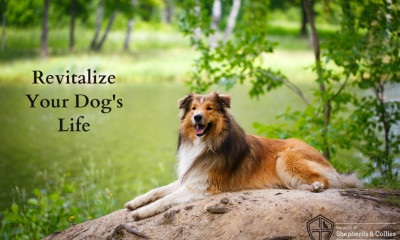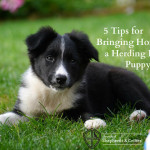Holistic Care: Revitalize Your Dog’s Life

An apple a day keeps the vet away. Well, maybe not an apple, but you get the gist. Humans aren’t the only ones that benefit from clean, natural foods and products. Maintaining the health of your herding breed dog can be as easy as stepping into your kitchen, if it’s stocked with the right things! Here are three areas to revitalize your dog's life in a natural, holistic way:
Inside
As highly active creatures, many herding dog breeds utilize a higher number of calories and nutrients than some of their more sedentary counterparts. Due to this fact, it’s essential that your dog receive a well-balanced diet. Here are a few ideas for providing your dog with some health and energy-enhancing, natural foods and supplements:
High Quality Fish Oils – the use of a high-quality fish oil supplement has been proven to be an effective supplement for dogs, providing them with easily utilized Omega-3 fatty acids. Some of these include anti-inflammatory properties for skin allergies/ailments, inflammatory diseases, immune system support and arthritic processes. Follow the instructions on the bottle or consult with your vet on dosages.
Bone Broth – an ancient staple, bone broth is full of minerals and vitamins contained within the bones that cook out, leaving a highly digestible, nutrient-dense liquid. The added nutrients from a small splash of bone broth a couple of times a day can help toward supplementing his current nutrient intake. Herding dogs put a lot of stress on their joints, bones and muscles; bone broth contains many building blocks to help maintain these tissues in top form. Always look for broths that do not contain onions (this can be a toxin for dogs) and are low in sodium. The best route is to make it yourself – you can find a great recipe here. Just be sure to omit the onion and other seasonings – your dog won’t miss them! *Warning: Do Not Give Dogs Bones - Learn Why!
Veggie and Fruit Snacks – not all dogs will readily eat vegetables and fruits, but if you ease your herding dog into it, he may just start looking forward to his daily dose of vegetables. As omnivores, dogs are able to digest plant material and utilize it for energy. Some that tend to be popular with dogs are cooked or raw carrots, sweet potatoes, small pieces of banana, cored apple and strawberries or blueberries. Avoid onions, garlic, grapes and raisins, as these can be toxic to dogs. For more good information on incorporating veggies and fruits into your dog’s diet, see here.
Outside
Herding dogs like to get down and dirty, often times requiring a bath after a hard day’s work or play. Keeping his coat from drying out and in top shape is a full-time job! Try some of these holistic approaches to skin and coat care to keep your dog looking and feeling his best!
Switch Shampoos – many shampoos contain sulfates, an ingredient that can dry and irritate. They’re essentially detergents. Many companies now offer alternatives that derive their cleansing ingredients from plant sources, making them more gentle. A quick and easy DIY dog shampoo?
- 1 cup Bronner’s Liquid Castile Soap (unscented version)
- ¼ cup baking soda
- 1 tablespoon honey
- 1 tablespoon coconut oil
Mix these all together, work well into your dog’s wet coat, then rinse, making sure no residue is left behind. The soothing ingredients and non-harsh castile soap should leave your dog’s coat nice and clean, with no itchiness.
Apple Cider Vinegar Rinse – to soothe itchy skin or restore pH, give your dog a quick apple cider vinegar rinse following his shampoo. ACV (apple cider vinegar) is a natural astringent and contains compounds that will soothe a multitude of skin irritations. If you use the organic, unfiltered type, such as Bragg’s, it also has beneficial bacteria that can help combat yeast and fungi (but don’t rely on it to cure these conditions!). To give your dog a vinegar rinse, mix one cup apple cider vinegar with one gallon of lukewarm water and drench your dog’s coat. You don’t need to rinse, and the light scent will go away when he dries. It has been reported that this also helps repel fleas, but for how long and with what efficacy is unclear.
Green Tea Face Wash – yes, a face wash for your furry friend. It doesn’t contain any of the miracle ingredients for toning and firming, but it does help clear the crud after a long day of working in dusty or pollen-covered conditions. Herding dogs are often down in the weeds and dirt, accumulating pollen and dust around their eyes, mouth and nose. Keep a bottle in the fridge to make it extra soothing on those hot days! It’s simple, but your dog will love you for it! To make the face wash, all you need is:
- 2 cups boiled, filtered or distilled water
- 3 organic green tea bags
Pour the hot water over the tea bags in a non-reactive container and let steep for about five to ten minutes. Remove the bags and allow the tea to cool. Place in a jar and store in the fridge. Using a clean, soft cotton cloth, wipe the entirety of your dog’s face as often as necessary, making sure to not get the tea in his eyes. This also works well for wiping away the “tear staining” some breeds - like Corgis - can experience.
Around the Home
Just as with people, your herding dog will get his best sleep in a comfortable, clean bed. Whether you choose to use organic or synthetic fiber bedding is completely up to you, but the care rules can apply to both. Here are some natural tips for keeping your pup’s bed comfy for a restful sleep:
- Wash his bedding in unscented detergent. Dogs have incredibly sensitive noses and the synthetic scents often used in conventional laundry soaps can be overpowering. To boost the cleaning power of your detergent, add 1 cup of baking soda per load, along with the soap.
- Don’t use fabric softener. Instead, put 1 cup white vinegar in the rinse cycle for a clean, soft, fresh bed.
- Wash your dog’s bedding at least every two weeks. Like humans, they shed skin cells, hair and oils over their bedding.
- Avoid cedar chip stuffing. It can cause respiratory problems in some dogs.
Although this is just the tip of the iceberg, there are hundreds of ways you can care for your herding dog more holistically. To find a holistic veterinarian near you, visit the American Holistic Veterinary Medical Association’s VetFinder.
*Please check with your veterinarian before giving your dog any supplements.
Article By:
Jennie Eilerts






